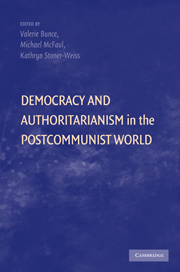
- Cited by 5
-
Cited byCrossref Citations
This Book has been cited by the following publications. This list is generated based on data provided by Crossref.
Huskey, Eugene and Iskakova, Gulnara 2010. The Barriers to Intra-Opposition Cooperation in the Post-Communist World: Evidence from Kyrgyzstan. Post-Soviet Affairs, Vol. 26, Issue. 3, p. 228.
Finkel, Evgeny and Brudny, Yitzhak M. 2012. No more colour! Authoritarian regimes and colour revolutions in Eurasia. Democratization, Vol. 19, Issue. 1, p. 1.
Obydenkova, Anastassia 2012. Comparative Democratisation: National–International Nexus of Analysis in Post-Communist Regime Transition. Europe-Asia Studies, Vol. 64, Issue. 6, p. 1127.
Markowitz, Lawrence P. and Radnitz, Scott 2021. Studying states and regimes in Central Asia: contributions to comparative politics and future challenges. Central Asian Survey, Vol. 40, Issue. 4, p. 576.
Passarelli, Gianluca 2022. The Process of Democratisation, the Political Parties and the Electoral Systems in the Western Balkans (1990–2020). Political Studies Review, Vol. 20, Issue. 4, p. 537.
- Publisher:
- Cambridge University Press
- Online publication date:
- June 2012
- Print publication year:
- 2009
- Online ISBN:
- 9780511804939


